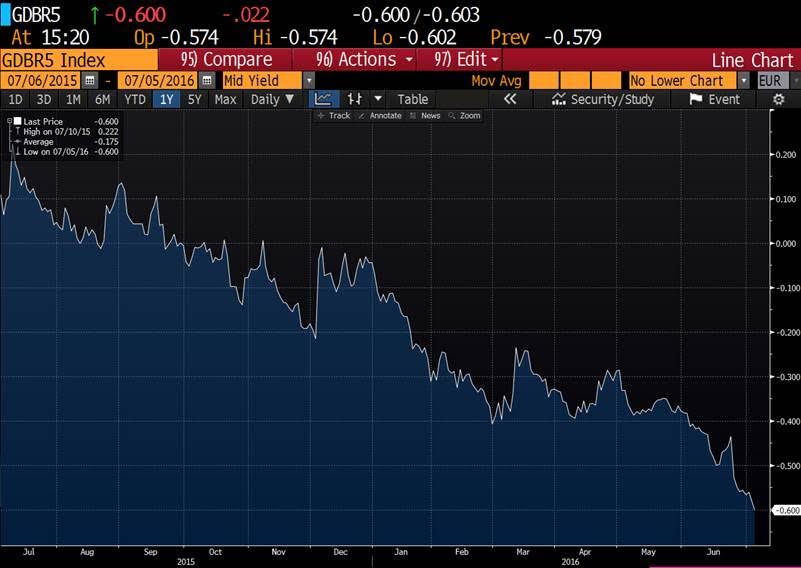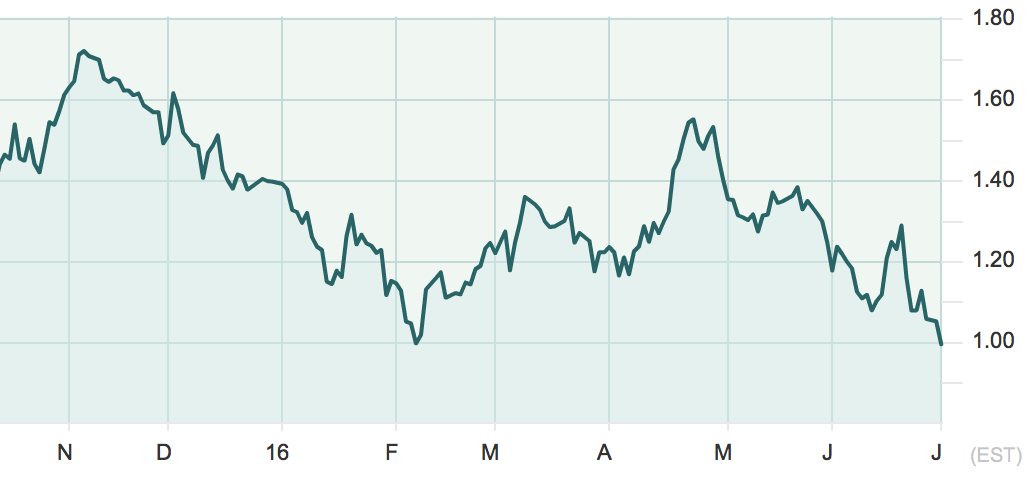 Brexit Fallout: Non-Radioactive (So Far)
Brexit Fallout: Non-Radioactive (So Far)
It’s been 12 days since Britain voted to cancel its EU membership. That news dropped a bomb on the market but thankfully it wasn’t nuclear.
So far, the pundits have brushed off any adverse effects for Canada. But dismissing Brexit’s impact on mortgage rates would be premature.
For one thing, it will continue causing insecurity among investors who read headlines like “Brexit Could Trigger the Next Financial Crisis — in Italy.” This kind of stuff conjures visions of contagion and drives investors into bonds for “safety.” Bond buying pushes down yields, which in turn sends fixed rates lower.
Longer term, any number of shoes could drop in the two or more years it takes Britain to depart the EU. That bearish cloud will overhang international markets for months to come, even here on this side of the pond.
As noted last time, Brexit is bearish for fixed rates but the jury is still out on variables (since risk and liquidity premiums could potentially make variable-rate mortgage funding more expensive for lenders, something that hasn’t happened yet).
Sub-Zero Yields Anchor Fixed Mortgage Rates
A stunning $12 trillion of government securities around the globe now have yields below zero. Germany’s 5-year bond is just the latest head-turner with its minus 0.60% interest rate.
5-year German Bond. Source: Bloomberg
Canada is not resistant to the enormous gravitational pull of this negative rate trend. As we speak, we’re creeping close to the all-time low of 0.39% on the 5-year bond. Keep a close eye on this chart in the coming weeks. Record low yields should bring record low mortgage rates.
Rate Moves of Late
Five-year fixed terms on the Spy are now less than 10 basis points from the previously inconceivable 1.99%. Mind you, that’s for insured low-frills mortgages only.
The insured/conventional rate gap continues to widen, which is absolutely unintuitive to pretty much every borrower in Canada. People with 20%+ equity (a.k.a. conventional borrowers) must now cough up another 18 bps, compared to the lowest 5-year fixed insured rates.
Variable rates edged a few basis points lower in the last 10 days. The Spy now lists seven providers under 2.00% on a 5-year variable.
Short-term fixed rates were little changed, but still represent a cheaper, more flexible alternative to variables. You’ll also get a few more features for the same price when you opt for a 1- or 2-year fixed.
Less Stingy 10-year Rates?
Lenders remain averse to discounting 10-year fixed rates. Ten-year terms are more expensive to fund and borrowers can escape a lender after five years simply by paying 3-months’ interest.
But lenders’ averseness may change because the 10-year bond yield is now under 1.00% for the first time in four months and just the second time ever. If these levels hold, there is no reason why decade mortgages can’t drop.
10-year Canadian Bond Yield. Source: MarketWatch
According to our data, the lowest tenner in the country is 3.44% from Sigma Mortgage. But profitability spreads support rates of 3.25% or less. The question is, which lender will pull the trigger?
In the event we see 2.99%, application volumes for 10-year rates will spike somewhat. Will they be a good buy at that number? No, not for most people. But the breakeven rate (i.e., how high rates must rise for a 10-year to be cheaper than a 5-year) will drop a full point. That’ll make fixed-10s significantly less bad than they are today.
Bearish Rate Report of the Week
TD is just the latest to opine on how the burgeoning senior population, as well as debt-strapped millennials, will spend less (here’s the full report). The executive summary: Debt and demographics are disinflationary trends with bearish long-term implications for mortgage rates.

 log in
log in

 Five-year fixed
Five-year fixed
 TD is just the latest to opine on how the burgeoning senior population, as well as debt-strapped millennials, will spend less (here’s the full
TD is just the latest to opine on how the burgeoning senior population, as well as debt-strapped millennials, will spend less (here’s the full
3 Comments
I’m curious to know what you think the floor for 5-yr fixed rates is? How low can they possibly go?
Hey JJ, The bottom is anyone’s guess but theoretically the overnight rate could drop a point from here if the economy laid an egg. In that case, 5-year government yields would probably be around zero. Add your typical 170 basis point mortgage spread and we could potentially see 1.69% on a 5-year fixed….someday.
But again, the growth picture would have to get gory for that to happen. Not something we’re rooting for…
Thanks for the response! Indeed, as much as we’d all love a rate like that I’m sure you’re right that things would be pretty ugly and we’d end up paying for it in other ways. Thanks again-love your site!